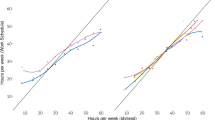Abstract.
Time-use information is preferably obtained from diaries, as this method is considered more reliable than information from questionnaires. Data from the Danish Time Use Survey 2001 thus indicate differences in the level of unpaid work, whereas only minor differences appear for paid work. That is: people reporting many hours of paid work tend to over-report the actual number of hours worked, while those reporting a small number of hours tend to underreport their contribution. For unpaid work, the same pattern appears. Moreover, men are found to be more unreliable than women in evaluating their amount of work on the labour market, while the opposite is the case for the unpaid/household work, with women underreporting their contribution more than men. The implication is that labour supplystudies based on questionnaire-information, i.e. Labour Force Surveys, are less accurate than studies based on diary-information.
Similar content being viewed by others
References
Bateson N. (1984). Data construction in socialsurveys. Contemporary Social Research Series 10 (Allen & Unwin. London)
Bonke J. (1997). Living Conditions in Denmark (in Danish)(Statistics Denmark and The Danish National Institute of Social Research)
Bonke J. (2002). Time and Welfare (in Danish). Report 02:26 (The Danish National Institute of Social Research)
Carlin P.S., L. Flood (1997). Do children affect the labor supplyof Swedish men?. Labour Economics 4(2)
Eurostat (2000). Guidelines on Harmonised European Time Use Surveys (European Commission & Eurostat, Luxembourg)
Gershuny, J. and J. P. Robinson: 1994). Measuring hours of paid work: Time-diary vs. estimate questions. Bulletin of Labour Statistics (ILO, Geneva)
G. Kalton (1985) Sample design issues in time diary studies F.T. Juster F.P. Stafford (Eds) Time, Goods and Well-Being (Institute for Social Research. University of Michigan Ann Arbor, MI 93–112
R.H. Kitteroed (2001) ArticleTitleDoes the recording of parallel activities in Time Use Diaries affect the way people report their main activities? Social Indicators Research 56 IssueID2 145–178
Kitteroed R.H. (2003). Diary versus Questionnaire Information on Time Spent on Housework: The Case of Norway. Paper presented at the 25th IATUR Conference on Time Use Research, Brussels 2003
P.L. Klump M. Perrez (2004) ArticleTitleWhy time-sampling studies can enrich work-leisure research Social Indicators Research 67 1–10
M.M. Marini B.A. Shelton (1993) ArticleTitleMeasuring household work: Recent experience in the United States Social Science Research 22 361–382
I. Niemi (1983) ArticleTitleSystematic bias in hours worked? Statistical Review 4 326–330
Niemi I. (1990). Measuring Work Activities and Hours Worked International Labour Office Workshop on Household Surveys of Labour Force for Eastern and Central Europe, Geneva.
I. Niemi (1993) ArticleTitle‘Systematic error in behavioral measurement: Comparing result from interview and time budget studies’ Social Indicator Research. 30 IssueID2–3 229–244
J.E. Press E. Townsley (1998) ArticleTitleWives’ and husbands’ housework reporting: Gender, class and social desirability Gender and Society 12 IssueID2 188–218
Qvortrup J. (1994). Børn halv pris. Nordisk barndom i samfundsperspektiv (SydjyskUniversitetsforlag, Esbjerg)
J.P. Robinson (1985) The validity and reliability of diariesversus alternative time use measures F.T. Juster F.P. Stafford (Eds) Time, Goods and Well-Being Institute for Social Research. University of Michigan Ann Arbor, MI 93–112
Author information
Authors and Affiliations
Corresponding author
Rights and permissions
About this article
Cite this article
Bonke, J. Paid Work and Unpaid Work: Diary Information Versus Questionnaire Information. Soc Indic Res 70, 349–368 (2005). https://doi.org/10.1007/s11205-004-1547-6
Accepted:
Issue Date:
DOI: https://doi.org/10.1007/s11205-004-1547-6




